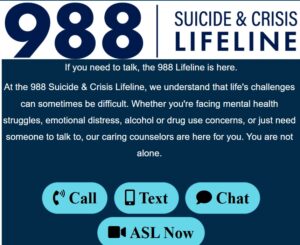Need help? Use this 988 Crisis line, made for Oregonians.
Call 988
At the 988 Suicide & Crisis Lifeline, we understand that life’s challenges can sometimes be difficult.
OHA is working to build a behavioral health crisis system where all Oregonians have someone to talk with.
Whether you’re facing mental health struggles, emotional distress, alcohol or drug use concerns, or just need someone to talk to, our caring counselors are here for you. You are not alone.
- Someone to call for support (988)
- Someone to respond in person (Mobile Crisis Intervention Services (MCIS) and Mobile Response and Stabilization Services for youth and their families)
- A safe place to go (such as Crisis Stabilization Centers)
Learn more about 988
| Option | Dial 988 |
|---|---|
| Veterans | Press 1 |
| Spanish/Español | Press 2 |
| All Others | Press 0 or remain on the line |
988 menu options are administered nationally and are subject to change. Learn more about current services.
Mobile Crisis Intervention Services (MCIS):
MCIS teams offer community-based intervention to individuals in need wherever they are; including at home, work or anywhere else in the community where the person is experiencing a crisis.
Crisis Stabilization Centers (CSC):
CSCs are short-term, in-person services located at facilities that address behavioral health crises, acute symptoms of mental illness, and substance use crisis.
The above crisis services can be accessed directly from local Community Mental Health Programs and by contacting 988.
Health Equity in Oregon’s Crisis System
Systemic and historical social injustice has harmed Oregon’s behavioral health crisis system. In turn, this has harmed many with lived experiences and from disproportionately affected communities. They include groups such as:
- Youth
- Rural populations
- Communnities of color
- Service members, veterans and their families
- Tribal communities
- People with disabilities
- People who identify as LGBTQIA2S+
OHA understands that some people may not want to call an emergency or crisis number. This is especially true if they:
- Had an emotional or mental health crisis in the past.
- Were adversely impacted by systemic and historical social injustice.
- Were harmed or mistreated by police or health care systems.
- This is why people with lived experience guide the future of Oregon’s behavioral health crisis system.
Call this number if you need help. Thank you.

